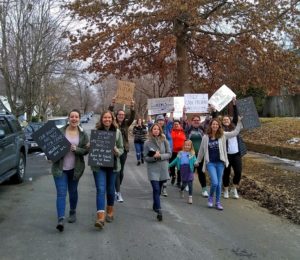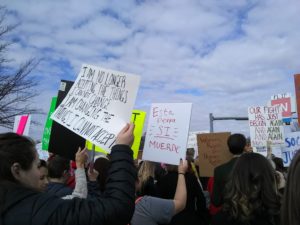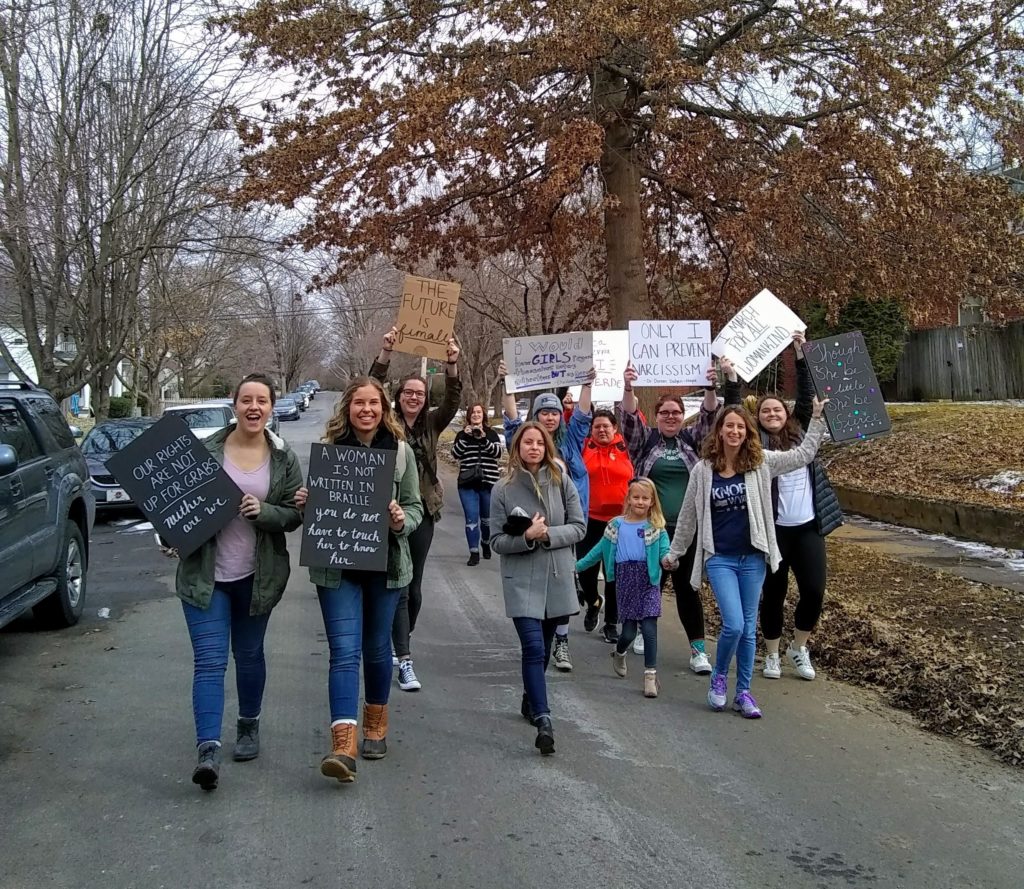Hundreds, including several Milligan and Emmanuel students, gathered in Johnson City for the Women’s March 2.0 on Jan. 20–exactly one year after President Donald Trump’s inauguration. This march was only one of the many happening across the nation.

The march convened in an ETSU parking lot at the intersection of University Parkway and State of Franklin at 1:15 p.m. and ended in Founders Park in the heart of downtown Johnson City at 2 p.m.– just under a mile walk.
A drum circle greeted the marchers as they gathered in the park, the rhythmic beating matching the marchers’ determination. The crowd was composed of women and men of all ages, most carrying signs with creative phrases that highlighted the variety of social and legislative issues regarding women’s rights represented at the rally.
“You can see from the signs all of the specific concerns that people have: immigration policy, bigoted standpoints of legislation or personalities in power, specific legislations involving women’s bodies,” Nathan Cachiaras said, an Emmanuel Christian Seminary student who attended the rally. “There are a lot of different agendas, but all are under the banner of working toward proactive demonstration of the inherent value of women.”
Speakers at the rally included local and state Democratic and independent candidates for the midterm elections coming up in November. Kate Craig, chairwoman of the Washington County Democratic Party, presided as master of ceremonies for the event.
This year’s march was held in solidarity with similar marches all over the nation, mirroring the first Women’s March organized last year in Washington D.C. in response to the inauguration.
Rachel Simmons, a senior psychology major who attended last year’s march in Washington D.C. as well as the more recent march in Johnson City, said, “I march for those who don’t have voices and for equal rights for everyone.” She added that “it’s important to be active in what we believe.”
Abigail Hook, a senior humanities major, shared that, despite nervousness of what friends and family would think about her association with the feminist movement, she joined in the local Women’s March last year in Jonesborough, as well as this year’s rally.

“I attended last year and knew, ‘Yes, these are the people with whom I want to stand today, and everyday,’” Hook recalled. “It is clarifying and strengthening in ways, just to know that I made a step–the right one–to both support and be supported.”
She added that since then, her “family has done a lot of work to hear the word feminism and not think of the nasty things that people say, but to think of me, and my face.”
Cachiaras said that he came to his own convictions concerning “the empowerment and equal opportunities for women in all spaces in society” through what he has witnessed “in Scripture and in the Spirit of God.”
“Gifts of God are given to people of God for the sake of the mission of God, and they are not discriminated among gender lines, racial lines or any other lines we could dream up,” he said, adding that Christians “have a responsibility to advocate for the equal recognition of those gifts and possibilities in the people of God.”
Simone Chuut, a senior public relations major, marched with a sign that read “Marching to Have More Women Pastors.”
Chuut described the church’s perspective in which she grew up as “one-sided and male-dominated.”
“There has not been a lot of room for female voice and influence,” she said. “Throughout my time at Milligan, I have learned that we need both voices. I want to be an advocate to allow for there to be more of a balance between the two and to see the full image of God through that.”
As a man advocating for women’s rights, Cachiaras said, “I am interested in letting the people I know see that I want to pay more than lip service to a safe theory while I sit in my white, male, heterosexual spot. Going to the march over the weekend doesn’t really prove that much, but I hope that it is a small demonstration and symbol of the ways I want to think, speak and work.”

